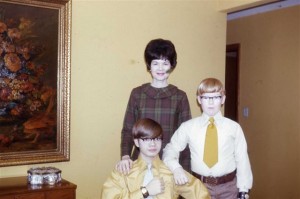I recently got around to reading The World of Yesterday, Stefan Zweig’s 1942 autobiography, about which I wrote in my “Sightings” column for last Friday’s Wall Street Journal.
This passage is from the foreword:
Both my father and my grandfather lived their lives in a single, direct way—it was one and the same life from beginning to end, without many vicissitudes, without upheaval and danger, a life of small tensions, imperceptible transitions, always lived in the same easy, comfortable rhythm as the wave of time carried them from the cradle to the grave. They spent all their days in the same country, the same city, usually even in the same house. As for what went on in the outside world, fundamentally that was only something they read in the newspaper, it did not come knocking at their doors. There was probably a war of some kind in progress somewhere in their time, but only a little one compared to the dimensions of modern warfare, and waged far away from their borders….But we have lived through everything without ever returning to our former lives, nothing was left of them, nothing was restored.
 I thought at once of my mother when I read those words. She grew up in Diehlstadt, a tiny village in southeast Missouri whose current population is 161, and moved as a young woman to Smalltown, U.S.A., which is a dozen miles away. Except for brief stays in two other nearby towns, she spent the rest of her life in Smalltown, and from 1961 until her death two years ago, she lived in the same house. She endured the Great Depression, World War II, the Korean War, and the Vietnam War, but except for the first of these events, none of them touched her directly. Like Zweig’s father and grandfather, she knew about the outside world only from reading about it (and, later, seeing it on TV). Outside of two brief visits to New York and a handful of summer vacations spent elsewhere, she scarcely ever traveled more than a hundred miles or so from the place where she was born.
I thought at once of my mother when I read those words. She grew up in Diehlstadt, a tiny village in southeast Missouri whose current population is 161, and moved as a young woman to Smalltown, U.S.A., which is a dozen miles away. Except for brief stays in two other nearby towns, she spent the rest of her life in Smalltown, and from 1961 until her death two years ago, she lived in the same house. She endured the Great Depression, World War II, the Korean War, and the Vietnam War, but except for the first of these events, none of them touched her directly. Like Zweig’s father and grandfather, she knew about the outside world only from reading about it (and, later, seeing it on TV). Outside of two brief visits to New York and a handful of summer vacations spent elsewhere, she scarcely ever traveled more than a hundred miles or so from the place where she was born.
Hers was a small life, in other words, but a satisfying one, and until old age started to wreak its final havoc on her body, I think she was basically happy. On occasion I took her to museums, concerts, and performances of various kinds, but while she enjoyed them, her family, friends, and home mattered far more. Instead of pining for wider horizons, she was content to see the world through my brother and me, and in due course through Lauren, her beloved granddaughter.
My life was wider and more tumultuous. It has taken me far from home, and I wouldn’t have had it any other way. But my own happiness—and I, too, count myself a mostly happy person, an ebullient pessimist—was surely rooted in part in the fortunate fact that unlike Stefan Zweig, I was always able to return to my former existence. Until my mother died, I went back to Smalltown two or three times each year to see her, and whenever I did so, I slept in my childhood bedroom. I had—in other words—deep roots in the world of yesterday.
What kind of person would I have become had those roots been pulled up when I was young? One of the many things that struck me about the movie Grosse Pointe Blank was the scene in which Martin Q. Blank (played by John Cusack) returns in early adulthood to the house where he grew up, only to discover that it has been torn down and replaced by a convenience store. “You can never go home again,” he later tells his psychotherapist, “but I guess you can shop there.”
 Is it any wonder that Martin grew up to be a contract killer? Or am I over-dramatizing the psychic consequences of living without roots? Certainly Stefan Zweig was unable in the end to cope with the loss of his own past. He moved to Brazil after writing The World of Yesterday, and there he killed himself, leaving behind this note:
Is it any wonder that Martin grew up to be a contract killer? Or am I over-dramatizing the psychic consequences of living without roots? Certainly Stefan Zweig was unable in the end to cope with the loss of his own past. He moved to Brazil after writing The World of Yesterday, and there he killed himself, leaving behind this note:
Before parting from life of my free will and in my right mind I am impelled to fulfil a last obligation: to give heartfelt thanks to this wonderful land of Brazil which afforded me and my work such kind and hospitable repose. My love for the country increased from day to day, and nowhere else would I have preferred to build up a new existence, the world of my own language having disappeared for me and my spiritual home, Europe, having destroyed itself.
But after one’s sixtieth year unusual powers are needed in order to make another wholly new beginning. Those that I possess have been exhausted by long years of homeless wandering.
Needless to say, I won’t do anything remotely like that should 713 Hickory Drive burn to the ground one day and be replaced by a 7-11. But I would grieve deeply if such a thing happened, for I know better than anyone how much it meant to me to have a childhood home—and a loving mother—that I could visit whenever I pleased. I have wandered far from Smalltown, but I’ve never been homeless. Neither was she.
* * *
A scene from Grosse Pointe Blank:
